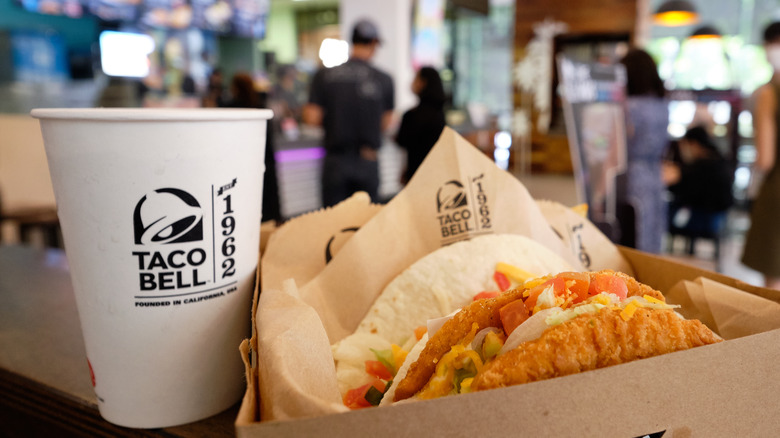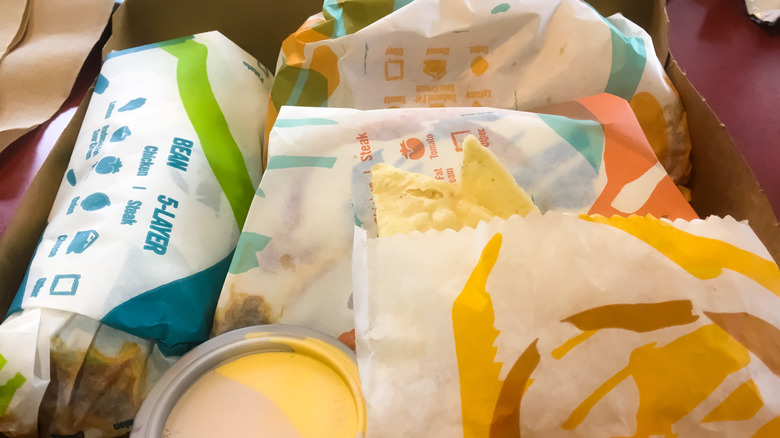The Bizarre Reason Taco Bell Was Once Sued For $2.18
In 2018, the popular fast food chain Taco Bell became entangled in a years-long lawsuit with a married couple from New Jersey, and it all started over a Taco Bell's Chalupa Cravings Boxes. That year, Taco Bell had been promoting the combo meal through a series of "Librarian" TV commercials, hoping to entice people to come in and give the deal a try, and got the attention of Nelson Estrella-Rojas and his wife, Joann Estrella.
In May 2018, the New Jersey couple saw the advertisement on television for the chain's Chalupa Cravings Boxes, which included a Chalupa Supreme, a Five-Layer Burrito, a Crunchy Taco, Cinnamon Twists, and a medium drink, all for just $5 each. Intrigued by the deal, they ventured to a nearby Taco Bell location to try out the deal for themselves (via My Central Jersey). They were able to place their order for two boxes with no problem, but issues arose when it came time to shell out for their purchase, which they expected to be somewhere in the $10 range.
The couple was billed $2.18 over the promotional price of the Taco Bell Cravings Boxes
However, to the couple's surprise, their bill came out to $12.99, rather than the expected $10. Eighty one cents of the total bill was state sales tax, but the remaining discrepancy came from the fact that they had each been charged an additional $1.09 over the advertised price for their meals. When the couple complained about the price difference, the manager of the location explained that the "legal fine print" in the commercial meant that individual Taco Bell locations could actually charge a different price than the deal that had been advertised, according to Newsweek.
After being dealt with what they deemed an unsatisfactory explanation, the couple decided to take the issue to court. Estrella-Rojas and Estrella filed a lawsuit in Superior Court in Middlesex County against Taco Bell and Yum! Brands, their parent company (who also owns KFC and Pizza Hut), citing "false and misleading advertisement." The suit was later moved to federal court, after Taco Bell successfully argued that they had no company headquarters in the state of New Jersey.
The lawsuit claimed Taco Bell violated the New Jersey's Consumer Fraud Statute
According to the couple's suit, Taco Bell's misleading advertising violated New Jersey's Consumer Fraud Statute, which required disclaimers to be "in a type size and style that is clear and conspicuous relative to the other type sizes and styles used in the advertisement." The lawsuit alleged that the couple had "sustained an ascertainable loss," not just in the unexpected $2.18 price difference, but in both time and gas wasted driving to and from their local Taco Bell location (via My Central Jersey). As compensation, they sought compensatory and punitive damages, as well as attorney's fees and court costs.
The Taco Bell advertising the couple found so misleading did have disclaimer — albeit in very fine print — warning customers that prices could vary by location. Part of the pricing discrepancy also comes from the fact that 93% of Taco Bell locations, like most of other fast food chains, are run by franchisees, who have a fair amount of power to set prices within their own stores, according to Newsweek.
A federal judge dismissed the Taco Bell lawsuit after 2 years
For their part, Taco Bell denied any wrongdoing, pointing out that their disclaimer, which was displayed at the end of the commercial, clearly stated the deal was only offered at "participating locations" and that "prices may vary." "Taco Bell and its franchisees are proud to provide millions of guests with delicious, affordable food every day. Our advertisements are truthful and accurate, and we will defend this case vigorously," the company said in a statement to Newsweek.
In April 2020, US District Court Judge William J. Martini sided with the fast food brand, throwing the case out of court. The federal court judge dismissed the case based on the grounds that the disclaimer was "clear and conspicuous and consistent with the norm of reasonable business practices," as well as the fact that the price of a Chalupa Cravings Boxes was clearly displayed on the menu at the New Jersey Taco Bell location, according to My Central Jersey. "Anyone familiar with television ads for consumer products knows that these disclaimers are often presented at the end of the ad toward the bottom of the [screen]...Had (the Estrellas) checked Taco Bell's website or called ahead to the Green Brook restaurant, they would have learned that the Green Brook restaurant was not participating in the promotion," the judge explained.



